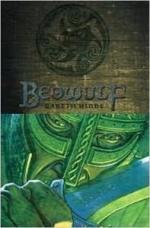Onfeng hraethe inwit-þancum (749).—Under ‘onfon’ H. says ’he received the maliciously-disposed one’; under ‘inwit-þanc’ he says ‘he grasped,’ etc.
Nieth-wundor seon (1366).—Under ‘nieth-wundor’ H. calls this word itself nom. sing.; under ‘seon’ he translates it as accus. sing., understanding ‘man’ as subject of ‘seon.’ H. and S. (3d edition) make the correction.
Forgeaf hilde-bille (1521).—H., under the second word, calls it instr. dat.; while under ‘forgifan’ he makes it the dat. of indir. obj. H. and S. (3d edition) make the change.
Brad and brun-ecg (1547).—Under ‘brad’ H. says ’das breite Hueftmesser mit bronzener Klinge’; under ‘brun-ecg’ he says ’ihr breites Hueftmesser mit blitzender Klinge.’
[110]
Yethelice (1557).—Under this word H. makes it modify ‘astod.’ If this be right, the punctuation of the fifth edition is wrong. See H. and S., appendix.
Selran gesohte (1840).—Under ‘sel’ and ‘gesecan’ H. calls these two words accus. plu.; but this is clearly an error, as both are nom. plu., pred. nom. H. and S. correct under ‘sel.’
Wieth sylfne (1978).—Under ‘wieth’ and ‘gesittan’ H. says ‘wieth = near, by’; under ‘self’ he says ‘opposite.’
þeow (2225) is omitted from the glossary.
For duguethum (2502).—Under ‘dugueth’ H. translates this phrase, ’in Tuechtigkeit’; under ‘for,’ by ‘vor der edlen Kriegerschaar.’
þaer (2574).—Under ‘wealdan’ H. translates þaer by ‘wo’; under ‘motan,’ by ‘da.’ H. and S. suggest ‘if’ in both passages.
Wunde (2726).—Under ‘wund’ H. says ‘dative,’ and under ‘wael-bleate’ he says ‘accus.’ It is without doubt accus., parallel with ‘benne.’
Strengum gebaeded (3118).—Under ‘strengo’ H. says ‘Strengum’ = mit Macht; under ‘gebaeded’ he translates ‘von den Sehnen.’ H. and S. correct this discrepancy by rejecting the second reading.
Bronda be lafe (3162).—A recent emendation. The fourth edition had ‘bronda betost.’ In the fifth edition the editor neglects to change the glossary to suit the new emendation. See ‘bewyrcan.’



